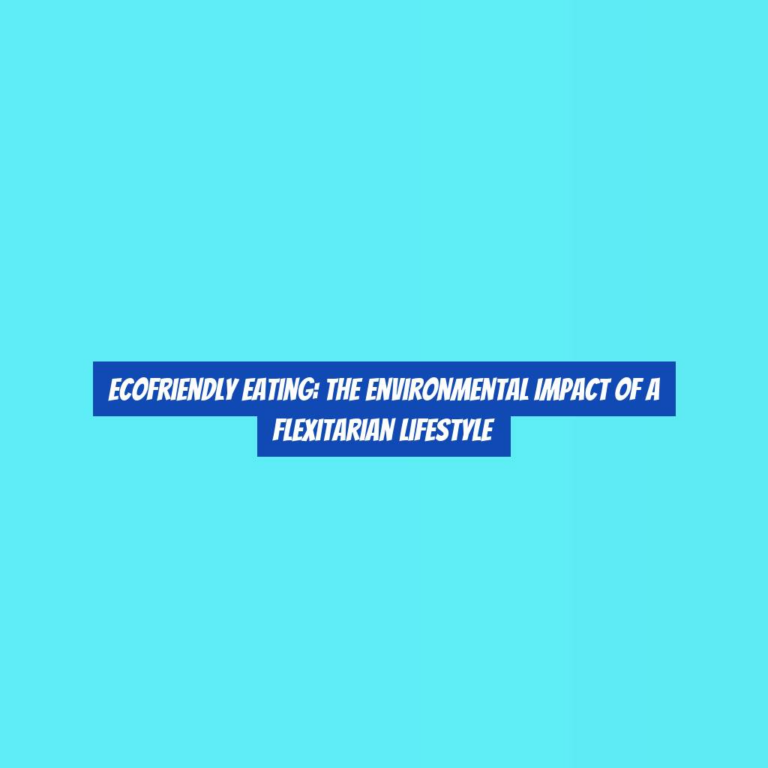Sustainability on Your Plate: Understanding the Environmental Benefits of Flexitarianism
Did you know that the production of one pound of beef requires an average of 1,800 gallons of water? ThatG??s just the tip of the iceberg when it comes to the environmental impact of our food choices.
As you sit down to enjoy your next meal, consider this: what you put on your plate can have a profound effect on the planet. By making a few simple changes to your diet, you can significantly reduce your carbon footprint and contribute to a more sustainable future.
But how exactly does flexitarianism fit into this equation?
Stay tuned to uncover the surprising environmental benefits of this increasingly popular approach to eating.
The Impact of Meat Production
The production of meat significantly contributes to environmental degradation through greenhouse gas emissions, land use, and water consumption. When you consume meat, youG??re supporting an industry thatG??s a major contributor to climate change.
Livestock farming produces a substantial amount of methane and nitrous oxide, which are potent greenhouse gases. These emissions have a significant impact on global warming and the destabilization of our climate.
Moreover, meat production requires vast amounts of land for grazing and growing animal feed. This leads to deforestation, habitat destruction, and biodiversity loss.
Additionally, the water footprint of meat is considerable, with large quantities required for livestock drinking, irrigation of feed crops, and processing. This puts pressure on already scarce water resources.
Benefits of Plant-Based Diets
Embracing a plant-based diet offers numerous health and environmental benefits. By focusing on consuming more fruits, vegetables, whole grains, nuts, and seeds, you can significantly lower your risk of chronic diseases such as heart disease, diabetes, and certain types of cancer. Plant-based diets are typically lower in saturated fats and higher in fiber, vitamins, and antioxidants, which can contribute to better overall health and well-being.
Additionally, choosing plant-based options can have a positive impact on the environment. Plant-based diets generally have a lower carbon footprint, requiring fewer natural resources such as water and land compared to traditional meat-heavy diets. By reducing your consumption of animal products, you can help mitigate the environmental impacts associated with factory farming, including deforestation, greenhouse gas emissions, and water pollution.
Furthermore, supporting plant-based agriculture promotes sustainable farming practices and biodiversity. Overall, incorporating more plant-based foods into your diet not only benefits your health but also contributes to a more sustainable and environmentally friendly food system.
Reducing Carbon Footprint
Reducing your carbon footprint starts with making conscious choices about the foods you consume and the impact they have on the environment. By adopting a flexitarian approach, you can significantly decrease the carbon emissions associated with your diet.
Here are four ways flexitarianism helps in reducing your carbon footprint:
Less Red Meat Consumption: Reducing the intake of red meat, particularly beef, can substantially lower your carbon footprint as the production of red meat is one of the leading contributors to greenhouse gas emissions.
Increased Plant-Based Foods: Embracing a diet rich in fruits, vegetables, and legumes can help reduce the environmental impact of your meals. Plant-based foods generally have a lower carbon footprint compared to animal-based products.
Supporting Sustainable Farming Practices: Choosing locally sourced and sustainably produced foods can diminish the carbon emissions associated with transportation and support environmentally friendly farming methods.
Minimized Food Waste: Being mindful of food waste and utilizing leftovers effectively can reduce the overall carbon footprint of your diet by decreasing the energy and resources used in food production and disposal.
Water Conservation and Flexitarianism
By choosing a flexitarian diet, you can significantly contribute to water conservation efforts and minimize the environmental impact of your food choices. The production of animal products, such as meat and dairy, requires substantial amounts of water. By reducing your consumption of these products and incorporating more plant-based foods into your diet, you can help conserve water resources.
Plant-based foods generally have a lower water footprint compared to animal products, as they require less water for growth and production. Additionally, the cultivation of grains, legumes, fruits, and vegetables typically demands far less water than raising livestock.
Furthermore, the shift towards a flexitarian diet can also help reduce the pollution of water sources. Livestock farming, particularly the mass production of animals for meat, is a significant contributor to water pollution through the discharge of animal waste and chemicals used in feed production. By consuming less meat and dairy, you can play a part in mitigating this pollution and promoting cleaner waterways.
Embracing a flexitarian approach to eating not only benefits your health but also supports vital water conservation efforts and contributes to a more sustainable food system.
Biodiversity and Sustainable Eating
Sustainable eating promotes the preservation of diverse ecosystems and the protection of species through mindful food choices and consumption habits. By incorporating more plant-based foods into your diet and reducing your intake of animal products, you can contribute to the conservation of biodiversity and the sustainability of our planet in the following ways:
Preserving Habitats: Choosing plant-based options reduces the demand for animal agriculture, which is a leading cause of deforestation and habitat destruction. By minimizing the need for vast land areas for livestock farming, you help protect natural habitats for countless species.
Supporting Genetic Diversity: Embracing a diverse range of fruits, vegetables, and grains encourages agricultural biodiversity. By consuming a variety of plant-based foods, you support the cultivation of different crop species, helping to maintain genetic diversity crucial for resilience against pests and diseases.
Minimizing Wildlife Impact: Opting for plant-based proteins over animal products reduces the pressure on wild populations. This shift in dietary choices lessens the demand for fishing and hunting, consequently easing the strain on marine and terrestrial wildlife.
Promoting Pollinator Health: Embracing a plant-focused diet supports the well-being of essential pollinators. By consuming a rich array of fruits, vegetables, and nuts, you contribute to the preservation of pollinator-friendly habitats and help safeguard the vital role of bees and other pollinating species in maintaining ecosystem health.
Conclusion
In conclusion, by adopting a flexitarian diet, you can make a positive impact on the environment.
Choosing to eat less meat and more plant-based foods can help reduce carbon emissions, conserve water, and support biodiversity.
Making small changes in your diet can have a big impact on the planet, and by being mindful of the environmental benefits of flexitarianism, you can contribute to a more sustainable future for all.






